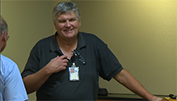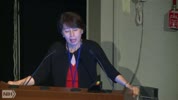-
- NIH VideoCast - PLOS Computational Biology Symposium
-
- - NIH Office of the Associate Director for Data Science (2016/11/24)
- - Category : Conferences
- The topic of the Symposium will be ??omputational Biology: Past, Present, and Future?? The Symposium will be chaired by Editors-in-Chief Ruth Nussinov and Jason Papin, and the journal?? Founding Editor-in-Chief, NIH?? own Philip E. Bourne. Keynote addresses will be given by David J. Lipman, Jennifer Lippincott-Schwartz, and Bert Vogelstein. The Symposium agenda also includes two Discussion Panels served by PLOS Computational Biology editors from a range of fields. The morning panel will discuss the ??iggest challenges and greatest opportunities in computational biology over the next 10 years?? The afternoon panel will discuss ??ow computational biology ??and computing in general ??will affect human health??
NIH VideoCast - PLOS Computational Biology Symposium
-
- NIH VideoCast - National Advisory Dental and Craniofacial - September 2016
-
- - NIDCR, NIH (2016/11/24)
- - Category : Advisory Board Meetings and Workshops
- The mission of the National Institute of Dental and Craniofacial Research (NIDCR) includes the support of basic, clinical and translational research as well as the support of research training and the development of research careers. To help achieve the goals of the NIDCR, the National Advisory Dental and Craniofacial Research Council (NADCRC) has the responsibility of advising, consulting with and making recommendations to the Secretary, DHHS, and the Director, NIDCR, on matters relating to the directions of research, research support, training and career development supported by the Institute. Included in this responsibility is the conduct of the secondary review of research grant applications with a focus on NIDCR scientific program priorities and program balance as well as the conduct of research by the Division of Intramural Research, NIDCR.
NIH VideoCast - National Advisory Dental and Craniofacial - September 2016
-
- NIH VideoCast - NICHD Advisory Council Meeting - September 2016
-
- - NICHD, NIH (2016/11/24)
- - Category : National Institute of Child Health and Human Development
- To help achieve the goals of the Institute, the NACHHD Council is charged with advising, consulting with, and making recommendations to the NICHD director on matters relating to the research and research support activities and functions of the Institute.
NIH VideoCast - NICHD Advisory Council Meeting - September 2016
-
- NIH VideoCast - Novel Animal Models to Study IL-23 Biology
-
- - Sergio A. Lira, M.D., Ph.D., Leona M. and Harry B. Helmsley Charitable Trust Professor of Immunology, Immunology Institute, Icahn School of Medicine at Mount Sina (2016/11/24)
- - Category : Immunology
- Immunology Interest Group Seminar Series
IL-23 has been implicated in the pathogenesis of inflammatory diseases such as colitis, psoriasis, and ankylosing spondylitis. To contribute to a better understanding of the role of IL-23 in these pathologies, we created a novel animal model (R23 mice), in which IL-23 p19 and p40 genes were placed behind a floxed STOP cassete in the Rosa26 locus. Intercrossing of the R23 mice with strains expressing cre recombinase in different tissues led to development of striking phenotypes. Expression of IL23 in CX3CR1+ cells led to perinatal lethality. IL-23 activated and expanded ILC3s, distinct from LTi cells, which produced IL-22, IL-17, IFN-款, and GM-CSF. These ILC3s accumulated under the epithelium in ICAM+ cell aggregates together with neutrophils. ILC3s caused the formation of discrete intestinal erosions in the small intestine, bleeding and neonatal death. IL-22 appeared to be the main pathogenic determinant, because deletion of IL-22 rescued the perinatal lethality. Conditional expression of IL-23 in CX3CR1+ cells in adults led to development of colitis that was dependent on lymphocytes and the microbiota, and that had a striking resemblance to human disease, with cycles of active disease (relapse/flares) followed by remission. Conditional expression of IL-23 in the skin, led to a severe inflammation and an unexpected phenotype. Together these results suggest that IL-23 pathogenesis is dependent on developmental stage and tissue in which it is expressed. The development of these novel animal models will permit in vivo dissection of the pathways triggered by IL-23 that result in disease.
NIH VideoCast - Novel Animal Models to Study IL-23 Biology
-
- NIH VideoCast - Bridging Knowledge Gaps to Understand How ZIKV Exposure and Infection Affect Child Development (Day 1)
-
- - NICHD, NIH (2016/11/24)
- - Category : Conferences
- GOALS
??Develop a clinical and research strategy on how to appropriately assess, evaluate, and monitor the neonate/infant/child affected by ZIKV in utero
??Describe the available complications of in utero ZIKV exposure and infection
??e.g. fetal anomalies such as microcephaly, global cerebellar hypoplasia, global cortical hypogyration, intracranial calcifications, ventriculomegaly, ocular and auditory abnormalities, abnormal motor function and muscle stiffness, abnormal cognitive, and behavioral development
??Use available information from other vertically transmitted pathogens to provide recommendations for assessment, evaluation, and management
??Outline the research needs for treatment and rehabilitation approaches that optimize cognitive and physical function for Zika-affected children
??Evaluate and expand on treatment options currently offered, such as intensive physical therapy and immersion therapies, role of parents and caregivers in treatments, including the evidence base for these therapies and current research gaps
For more information go to https://www.nichd.nih.gov/about/meetings/2016/Pages/092216.aspx
NIH VideoCast - Bridging Knowledge Gaps to Understand How ZIKV Exposure and Infection Affect Child Development (Day 1)
-
- NIH VideoCast - Bridging Knowledge Gaps to Understand How ZIKV Exposure and Infection Affect Child Development (Day 2)
-
- - NICHD, NIH (2016/11/24)
- - Category : Conferences
- GOALS
??Develop a clinical and research strategy on how to appropriately assess, evaluate, and monitor the neonate/infant/child affected by ZIKV in utero
??Describe the available complications of in utero ZIKV exposure and infection
??e.g. fetal anomalies such as microcephaly, global cerebellar hypoplasia, global cortical hypogyration, intracranial calcifications, ventriculomegaly, ocular and auditory abnormalities, abnormal motor function and muscle stiffness, abnormal cognitive, and behavioral development
??Use available information from other vertically transmitted pathogens to provide recommendations for assessment, evaluation, and management
??Outline the research needs for treatment and rehabilitation approaches that optimize cognitive and physical function for Zika-affected children
??Evaluate and expand on treatment options currently offered, such as intensive physical therapy and immersion therapies, role of parents and caregivers in treatments, including the evidence base for these therapies and current research gaps
For more information go to https://www.nichd.nih.gov/about/meetings/2016/Pages
NIH VideoCast - Bridging Knowledge Gaps to Understand How ZIKV Exposure and Infection Affect Child Development (Day 2)
-
- NIH VideoCast - NCI Council of Research Advocates Meeting - September 2016
-
- - OAR, NCI, NIH (2016/11/24)
- - Category : Advisory Board Meetings and Workshops
- The 72nd meeting of the NCI Council of Research Advocates will be held on Monday, September 26th, 2016 from 9:00 a.m. to 4:30 p.m.
NIH VideoCast - NCI Council of Research Advocates Meeting - September 2016
-
- NIH VideoCast - DailyMed/RxNorm Jamboree Workshop 2016
-
- - NLM, NIH (2016/11/24)
- - Category : Conferences
- The emphasis as always is on practical and novel ways to use and understand this free drug information, which is produced and consumed by a number of Federal agencies.
For more information go to https://www.nlm.nih.gov/mesh/Jamboree/2016.html
NIH VideoCast - DailyMed/RxNorm Jamboree Workshop 2016
-
- NIH VideoCast - Redox Biology 2016: Introduction, Redox chemistry
-
- - David Wink Ph.D., NCI, NIH and Terry Moody, Ph.D., NCI, NIH (2016/11/24)
- - Category : Redox Biology
- Introduction, Redox chemistry
For more information go to http://ccr.cancer.gov/trainee-resources-courses-workshops-rb
NIH VideoCast - Redox Biology 2016: Introduction, Redox chemistry
-
- NIH VideoCast - Iron Screening and Supplementation of Iron-replete Pregnant Women and Children (Day 1)
-
- - Office of Dietary Supplements, NIH (2016/11/24)
- - Category : Conferences
- Iron is well recognized as an essential nutrient needed for growth and development. Iron deficiency has serious consequences and, for this reason, is a public health concern particularly for pregnant women and young children (6-24 months). At the same time, ensuring sufficient intakes of iron must be balanced by avoiding too much iron as there are also consequences to excessive iron intake. The Office of Dietary Supplements (ODS) at the National Institutes of Health (NIH) is sponsoring an open public meeting titled, ??ron Screening and Supplementation of Iron??eplete Pregnant Women and Young Children,??September 28-29, 2016, at NIH (Bethesda, MD) in collaboration with federal cosponsors. The agenda includes presentations by experts in the field coupled with panel discussions, as well as the opportunity for questions and answers from the workshop audience.
Workshop Goals
??Provide a focus for iron screening and supplementation in the U.S. and developed countries
??Specify data gaps and research needs by:
??Exploring current understanding of iron homeostasis in pregnant women and in young children (6??4 months)
??Identify the challenges associated with measuring iron status and with screening practices
??Consider emerging issues associated with routine supplementation of iron??eplete pregnant women.
Who should attend? All persons are invited to attend, especially clinical educators, those who develop clinical recommendations, health care providers and researchers.
For more information go to https://ods.od.nih.gov/Research/Iron.aspx
NIH VideoCast - Iron Screening and Supplementation of Iron-replete Pregnant Women and Children (Day 1)
-
- NIH VideoCast - National Advisory Council on Aging - September 2016
-
- - National Advisory Council on Aging, NIH (2016/11/24)
- - Category : Advisory Board Meetings and Workshops
- The National Advisory Council on Aging (NACA) advises the Secretary of the U.S. Department of Health and Human Services, the Director of NIH, and the Director of NIA on its mission. The Council meets three times a year to consider applications for research and training and to recommend funding for promising applications.
NIH VideoCast - National Advisory Council on Aging - September 2016
-
- NIH VideoCast - Ethical and Regulatory Aspects of Clinical Research Session 1: History and Framework for Ethical Clinical Research
-
- - Christine Grady, Susan E. Lederer, Ivor Pritchard (2016/11/24)
- - Category : Bioethics
- The Department of Bioethics offers this seven to eight week course annually each fall. The course is designed to provide an overview of the important issues in the ethics of human subject research for clinical investigators and others who participate in the conduct of research and is open to the entire NIH community as well as to those from outside NIH. Topics include the history of human subject research ethics, principles and guidelines, study design, subject recruitment, informed consent, and international research. The course is open to the entire NIH community as well as to those from outside NIH. The recommended textbook is Ethical and Regulatory Aspects of Clinical Research, edited by Emanuel et al (Johns Hopkins University Press). The course is taught by guest faculty and faculty members from the National Institutes of Health. This is a required academic program for Bioethics fellows.
NIH VideoCast - Ethical and Regulatory Aspects of Clinical Research Session 1: History and Framework for Ethical Clinical Research
-
- NIH VideoCast - CC Grand Rounds: 1) Persistent Effect of Intensive Glycemic Control on Diabetic Retinopathy in Type 2 Diabetes and 2) Dysglycemia, Vasculopenia, and the Chronic Consequences of Diabetes
-
- - 1) Emily Chew, MD, Deputy Clinical Director and Deputy Director, Division of Epidemiology and Clinical Applications, NEI, NIH and 2) Hertzel Gerstein, MD, MSc, FRCPC, Professor of Medicine and Population Health Research Institute Chair in Diabetes, McMaster University, Hamilton, Canada (2016/11/24)
- - Category : Clinical Center Grand Rounds
- CC Grand Rounds: 1) Persistent Effect of Intensive Glycemic Control on Diabetic Retinopathy in Type 2 Diabetes and 2) Dysglycemia, Vasculopenia, and the Chronic Consequences of Diabetes
For more information go to http://www.cc.nih.gov/about/news/grcurrent.html
NIH VideoCast - CC Grand Rounds: 1) Persistent Effect of Intensive Glycemic Control on Diabetic Retinopathy in Type 2 Diabetes and 2) Dysglycemia, Vasculopenia, and the Chronic Consequences of Diabetes
-
- NIH VideoCast - Engineering T cells: moving beyond leukemia
-
- - Carl June, M.D., Richard W. Vague Professor in Immunotherapy and Director of the Center for Cellular Immunotherapies at the Perelman School of Medicine; Director of the Parker Institute for Cancer Immunotherapy at the University of Pennsylvania (2016/11/24)
- - Category : WALS - Wednesday Afternoon Lectures
- NIH Director?? Wednesday Afternoon Lecture Series
It is now well established that the immune system can control and eliminate cancer cells. Adoptive T-cell transfer has the potential to overcome the significant limitations associated with vaccine-based strategies in patients who are often immune compromised. Dr. June will discuss how the emerging discipline of synthetic biology-which combines elements of genetic engineering and molecular biology to create new biological structures with enhanced functionalities-can be applied to cancer. He will also talk about the outlook for chimeric antigen receptor (CAR) and T-cell receptor (TCR) T-cell therapies, including managing toxicities and expanding the availability of personalized cell therapy as a promising approach to all hematologic malignancies and solid tumors. Many questions remain in the field of CAR T cells, but the encouraging response rates pave a wide road for future investigation.
Carl June is the Richard W. Vague Professor in Immunotherapy in the Department of Pathology and Laboratory Medicine. He is currently Director of the Center for Cellular Immunotherapies at the Perelman School of Medicine, and Director of the Parker Institute for Cancer Immunotherapy at the University of Pennsylvania. He is a graduate of the Naval Academy in Annapolis, and Baylor College of Medicine in Houston, 1979. He had graduate training in Immunology and malaria with Dr. Paul-Henri Lambert at the World Health Organization, Geneva, Switzerland from 1978-79, and post-doctoral training in transplantation biology with E. Donnell Thomas and John Hansen at the Fred Hutchinson Cancer Research Center in Seattle from 1983 - 1986. He is board certified in Internal Medicine and Medical Oncology. He maintains a research laboratory that studies various mechanisms of lymphocyte activation that relate to immune tolerance and adoptive immunotherapy for cancer and chronic infection. In 2011, his research team published findings detailing a new therapy in which patients with refractory and relapsed chronic lymphocytic leukemia were treated with genetically engineered versions of their own T cells. The treatment has also now also been used with promising results to treat children with refractory acute lymphoblastic leukemia. He has published more than 350 manuscripts and is the recipient of numerous prizes and honors, including election to the Institute of Medicine in 2012 and the American Academy of Arts and Sciences in 2014, the William B Coley award, the Richard V Smalley Memorial Award from the Society for Immunotherapy of Cancer, the AACR-CRI Lloyd J. Old Award in Cancer Immunology, the Philadelphia Award in 2012, the Taubman Prize for Excellence in Translational Medical Science in 2014 (shared with S. Grupp, B. Levine, D. Porter), the Paul Ehrlich and Ludwig Darmstaedter Prize (shared w J. Allison), the Novartis Prize in Immunology (shared with Z. Eshaar and S. Rosenberg), the Karl Landsteiner Memorial award, the Debrecen Award and a lifetime achievement award from the Leukemia and Lymphoma Society.
For more information go to https://oir.nih.gov/wals
NIH VideoCast - Engineering T cells: moving beyond leukemia
-
- NIH VideoCast - Iron Screening and Supplementation of Iron-replete Pregnant Women and Children (Day 2)
-
- - Office of Dietary Supplements, NIH (2016/11/24)
- - Category : Conferences
- Iron is well recognized as an essential nutrient needed for growth and development. Iron deficiency has serious consequences and, for this reason, is a public health concern particularly for pregnant women and young children (6-24 months). At the same time, ensuring sufficient intakes of iron must be balanced by avoiding too much iron as there are also consequences to excessive iron intake. The Office of Dietary Supplements (ODS) at the National Institutes of Health (NIH) is sponsoring an open public meeting titled, ??ron Screening and Supplementation of Iron??eplete Pregnant Women and Young Children,??September 28-29, 2016, at NIH (Bethesda, MD) in collaboration with federal cosponsors. The agenda includes presentations by experts in the field coupled with panel discussions, as well as the opportunity for questions and answers from the workshop audience.
Workshop Goals
??Provide a focus for iron screening and supplementation in the U.S. and developed countries
??Specify data gaps and research needs by:
??Exploring current understanding of iron homeostasis in pregnant women and in young children (6??4 months)
??Identify the challenges associated with measuring iron status and with screening practices
??Consider emerging issues associated with routine supplementation of iron??eplete pregnant women.
Who should attend? All persons are invited to attend, especially clinical educators, those who develop clinical recommendations, health care providers and researchers.
For more information go to https://ods.od.nih.gov/Research/Iron.aspx
NIH VideoCast - Iron Screening and Supplementation of Iron-replete Pregnant Women and Children (Day 2)
-
- NIH VideoCast - Rehabilitation Research Resource to Enhance Clinical Trials (Day 1)
-
- - NIH (2016/11/24)
- - Category : Conferences
- This 2 day conference will facilitate stakeholder ??clinicians, healthcare providers, industry experts, innovators, government representatives, researchers and students ??participation in key sessions. They include clinical needs for precision medicine, enabling technologies for POC, regulatory issues for POC devices, and sustainable global business models to support POC technologies in resource limited environments.
NIH VideoCast - Rehabilitation Research Resource to Enhance Clinical Trials (Day 1)
-
- NIH VideoCast - Rehabilitation Research Resource to Enhance Clinical Trials (Day 2)
-
- - NIH (2016/11/24)
- - Category : Conferences
- This 2 day conference will facilitate stakeholder ??clinicians, healthcare providers, industry experts, innovators, government representatives, researchers and students ??participation in key sessions. They include clinical needs for precision medicine, enabling technologies for POC, regulatory issues for POC devices, and sustainable global business models to support POC technologies in resource limited environments.
NIH VideoCast - Rehabilitation Research Resource to Enhance Clinical Trials (Day 2)
-
- NIH VideoCast - NIH Challenge Symposium 2016
-
- - Office of the Associate Director for Data Science (ADDS Office), NIH (2016/11/24)
- - Category : Conferences
- The Office of the Associate Director for Data Science (ADDS Office) is pleased to announce a Challenge Symposium to explore the use of challenges as a mechanism for achieving scientific goals. The symposium will start with remarks from Tom Kalil, Deputy Director for Policy at the White House Office of Science and Technology Policy. Next, Dr. Karim Lakhani, a Harvard Business School professor who does research on challenges and innovation, will give a lecture as part of the Frontiers in Data Science series. The symposium will conclude with a panel discussion.
1:30 Introductions
1:35 ??2:00 View from the White House, Tom Kalil
2:00 ??3:00 Should we go to the crowd first? Lessons from running crowd contests in life sciences: How and Why Crowd Contests for Algorithm Development Work, Karim Lakhani (45min + 15min questions)
3:00 ??4:00 Panel: Resources to enable challenges Lora Kutkat (NIH), Sandeep Patel (HHS), and Chris Nelson (OSTP)
NIH VideoCast - NIH Challenge Symposium 2016
-
- NIH VideoCast - TRACO 2016: TGF beta and topoisomerase
-
- - Sonia B. Jakowlew, Ph.D, NCI, NIH and Yves Pommier, M.D., Ph.D., NCI, NIH (2016/11/24)
- - Category : TRACO
- TGF beta and topoisomerase
For more information go to http://ccr.cancer.gov/trainee-resources-courses-workshops-traco
NIH VideoCast - TRACO 2016: TGF beta and topoisomerase






















